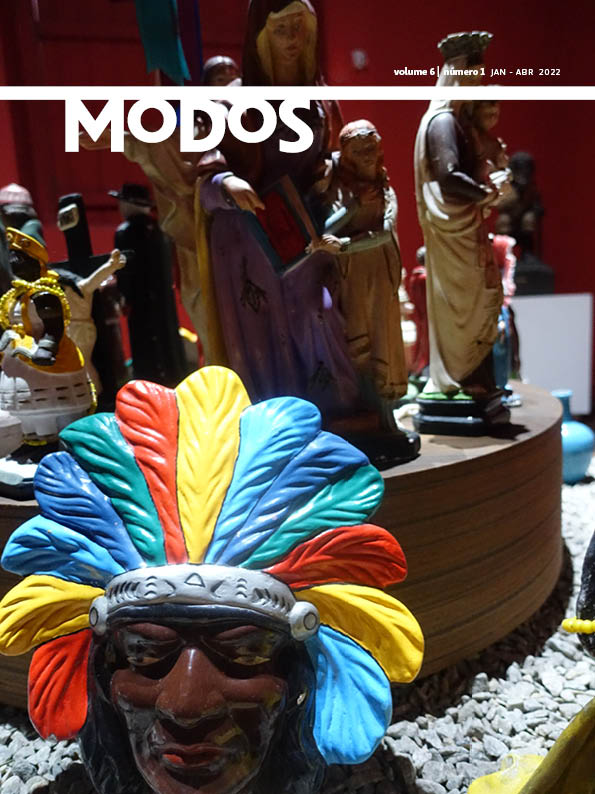Resumo
Entre as décadas de 1940 e 1960, os artistas Dimitri Ismailovitch e Maria Margarida Soutello, ambos de origem europeia e imigrados ao Brasil, produziram juntos uma série de obras representando figuras negras e versando sobre temáticas ligadas à afro-brasilidade. O presente artigo examina essa produção e discute sua primeira recepção, com o objetivo de tentar compreender sua inserção no contexto cultural da época. Longe de entender essas obras como mera apropriação cultural, aprofunda-se a análise daquilo que será chamado aqui de ‘imaginação diaspórica’. Argumenta-se que a condição de deslocamento e dupla consciência dos artistas, característica do exílio, canalizou seu olhar sobre a negritude para um esforço de reinvenção identitária por meio da mascarada e do misticismo. O aspecto carnavalesco da cultura brasileira permitiu que essa construção imaginária prosperasse, se constituindo em realidade social.
Referências
ANTONISCH, M. Searching for belonging – an analytical framework. Geography Compass, v.4, n. 6, p.644-659, 2010.
A VIDA SOCIAL. ISMAILOVITCH 1940. Correio da Manhã, Rio de Janeiro, p.11, 14 set. 1940.
AXEL, B. K. The diasporic imaginary. Public Culture, Durham, 14(2), p.411-428, 2002.
AYGUN, E. Dimitri Ismailovitch, Metromod Archive, Ludwig-Maximilians-Universität, Munique, Alemanha; METROMOD, Public Interface, METROMOD Archive, 2021.
CAMPOS, M. J. Arthur Ramos: Luz e sombra na antropologia brasileira. Uma versão da democracia racial no Brasil nas décadas de 1930 e 1940. Rio de Janeiro: Edições da Biblioteca Nacional, 2004.
CARDOSO, R. Modernity in Black and White: Art and Image, Race and Identity in Brazil, 1890-1945. Cambridge: Cambridge University Press, 2021.
CAVALCANTI, E. M. A ceia brasileira de Ismailovitch: Homenagem ao Aleijadinho. Rio de Janeiro: Museu Villa-Lobos, 2014.
CLIFFORD, J. The Predicament of Culture: Twentieth-Century Ethnography, Literature, and Art. Cambridge: Harvard University Press, 1988.
CONDURU, R. Formações transatlânticas – Mestre Didi, Martiniano do Bonfim e a arte da África no Brasil desde os oitocentos. 19&20, Rio de Janeiro, v.16, n.1, jan./jun. 2021.
CRAVEN, D. Art History as Social Praxis: the Collected Writings of David Craven [organizado por Brian Winkenweder]. Leiden: Brill, 2017.
DA RÚSSIA CZARISTA AO SOLAR DE SÃO CLEMENTE. Revista da Semana, p.9-12, 20 out. 1945.
DOGRAMACI, B.; MERSMANN, B. (orgs.). Handbook of Art and Global Migration: Theories, Practices and Challenges. Berlin: De Gruyter, 2019.
DOYLE, L.; WINKIEL, L. (orgs.). Geomodernisms: Race, Modernism, Modernity. Bloomington: Indiana University Press, 2005.
DRUMMOND DE ANDRADE, C. D. de. O pintor, a cidade, o santo. Correio da Manhã, 26/04/1964, 1º caderno, p.6.
ECKMANN, S. Exile and modernism: Theoretical and methodological reflections on the exile of artists in the 1930s and 1940s. Stedelijk Studies, Amsterdam, n.9, p1-14, fall 2019.
FLUSSER, V. In: FINGER, A. (org.). The Freedom of the Migrant: Objections to Nationalism [traduzido por Kenneth Kronenberg]. Urbana: University of Illinois Press, 2003.
FREEDBERG, D. The Power of Images: Studies in the History and Theory of Response. Chicago: University of Chicago Press, 1989.
GELL, A. Art and Agency: an Anthropological Theory. Oxford: Clarendon, 1998.
GILROY, P. The Black Atlantic: Modernity and Double Consciousness. London: Verso, 1993.
GOMES DA CUNHA, O. M. Sua alma em sua palma: Identificando a ‘raça’ e inventando a nação. In: PANDOLFI, D. (org.). Repensando o Estado Novo. Rio de Janeiro: Fundação Getúlio Vargas, 1999.
HILLER, S. (org.). The Myth of Primitivism: Perspectives on Art. London: Routledge, 1991.
ITZIGSOHN, J.; BROWN, K. L. The Sociology of W.E.B. Du Bois: Racialized Modernity and the Global Color Line. New Yook: New York University Press, 2020.
LIMA, H. Alvarus e seus bonecos. Rio de Janeiro: Ministério da Educação e Cultura, 1954.
LIRA NETO. Uma história do samba: Volume I (as origens). São Paulo: Companhia das Letras, 2017.
MACEDO, D. de. A pintora Maria Margarida. Ocidente. Revista Portuguesa Mensal, Lisboa, v.42, n.165/170, p.252-256, 1952.
MISHRA, V. The diasporic imaginary: Theorizing the Indian diaspora. Textual Practice, 10(3), p.421-447, 1996.
MITTER, P. Decentering modernism: Art history and avant-garde art from the periphery. The Art Bulletin, New York, n.90, p.531-548, 2008.
MOREL, M. M. Eu pintei o anjo negro. Revista da Semana, Rio de Janeiro, p.46, 30 maio 1953.
OGUIBE, O. Exile and the creative imagination. Portal. Journal of Multidisciplinary International Studies, Sydney, v.2, n.1, p.1-17, 2005.
PAPASTERGIADIS, N. Modernity as Exile: the Stranger in John Berger’s Writing. Manchester: Manchester University Press, 1993.
PAZ, E. A. Sôdade do cordão. Rio de Janeiro: ELF/Fundação Universitária José Bonifácio, 2000.
QUAYSON, A.; DASWANI, G. (orgs.). A Companion to Diaspora and Transnationalism. Oxford: Wiley-Blackwell, 2013.
RAMOS, A. Introdução à antropologia brasileira. 2º volume. As culturas européias e os contatos raciais e culturais. Rio de Janeiro: Casa do Estudante do Brasil, 1947.
ROGERS, R. A. From cultural exchange to transculturation: A review and reconceptualization of cultural appropriation. Communication Theory, Oxford, v.16, n.4, p.474-503, nov. 2006.
SAID, E. W. Reflections on Exile and other Literary and Cultural Essays. London: Granta, 2001.
SCHNEIDER, A. On ‘appropriation’: A critical reappraisal of the concept and its application in global art practices. Social Anthropology, v.11, n.2, p.215-229, 2003.
SEIDEL, M. Exile and the Narrative Imagination. New Haven: Yale University Press, 1986.
SGARBI, O. A nacionalisação da arte. Vida Doméstica, Rio de Janeiro, s.p., abr. 1938.
SMITH, T. L. Brazil: People and Institutions. Baton Rouge: Louisiana State University Press, 1954.
STAM, R.; SHOHAT, E. Race in Translation: Culture Wars around the Postcolonial Atlantic. New York: New York University Press, 2012.
TEIXEIRA LEITE, J. R. Literatura e arte. Revista da Semana, Rio de Janeiro, p.6, 12 out. 1957.
TORGOVNICK, M. Gone Primitive: Savage Intellects, Modern Lives. Chicago: University of Chicago Press, 1990.
VALLE, A. Arte sacra afrobrasileira na imprensa: Alguns registros pioneiros, 1904-1932. 19&20, 13(1), 2018.
YOUNG, J. O.; BRUNK, C. G. (orgs.). The Ethics of Cultural Appropriation. Oxford: Wiley-Blackwell, 2012.
ZIFF, B.; RAO, P. V. (orgs.). Borrowed Power: Essays on Cultural Appropriation. New Brunswick: Rutgers University Press, 1997.

Este trabalho está licenciado sob uma licença Creative Commons Attribution-NonCommercial-ShareAlike 4.0 International License.
Copyright (c) 2022 Rafael Cardoso

